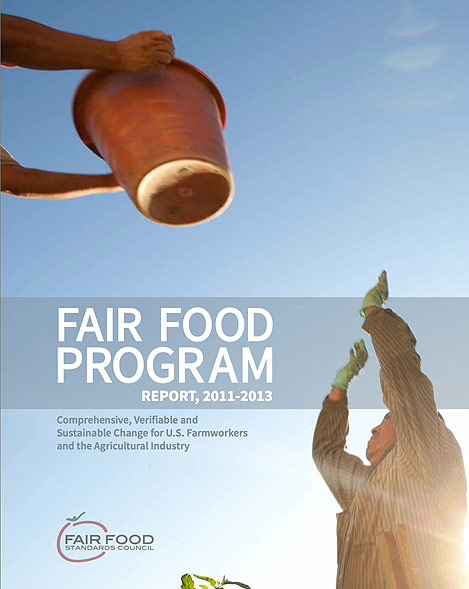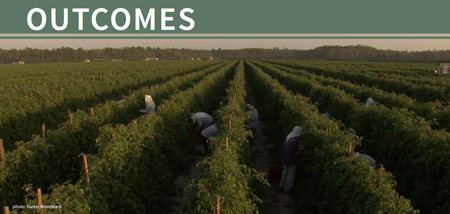[hupso_hide][hupso title=”First ever #FairFoodProgram Report now online!” url=”https://ciw-online.org/?p=17259″]
The report, issued by the Fair Food Standards Council (FFSC), offers unprecedented insight into the outcomes — both the concrete advances and the continuing challenges — from the first two harvest seasons under the oversight of the FFSC…
As the Fair Food Program enters its third season in full effect in Florida’s $650 million tomato industry, the Fair Food Standards Council — the third party monitoring organization that audits Participating Growers’ farms, investigates workers’ complaints, and enforces the Fair Food Code of Conduct — has issued its inaugural “State of the Program” report. The report constitutes “an assessment of the implementation of the Fair Food Program in the Florida tomato industry, covering a two-year period that began in November 2011.” It is available online here.
The report is a great read and provides many valuable insights into the unprecedented advances of the first two seasons of the Fair Food Program’s operation in Florida’s fields, the mechanisms that together form the FFP’s worker-led approach to social responsibility, and the innovative standards that make up the Fair Food Code of Conduct. At the same time, the report takes a clear-eyed look at the challenges for compliance that remain following the first two years of implementation. The report also includes extensive background on the origins and objectives of the Fair Food Program that provides context for “understanding the progress of the past two seasons, and of those that lie ahead.”
So head on over to the Fair Food Standards Council website and download a copy today. Here’s a brief excerpt to get you started:
OVERVIEW
Since November 2011, implementation of the Fair Food Code of Conduct has begun to bring about many far-reaching reforms across the Florida tomato industry. While the degree of change remains uneven from grower to grower, in the span of just two years:
- Workers have brought forth 304 complaints under the Fair Food Program;
- Fair Food Standards Council auditors have conducted nearly 60 comprehensive audits, visited 45 farm locations, and interviewed 4,000 workers to assess Participating Growers’ compliance with the Code;
- The Coalition of Immokalee Workers has conducted 161 worker-to-worker education sessions, attended by well over 14,000 workers; and
- Participating Buyers have paid more than $11 million in Fair Food Premiums to improve workers’ wages.
Beyond the numbers, an even more remarkable story is unfolding. Before proceeding to a detailed breakdown of Code implementation, three accomplishments merit further discussion.
Ten years ago, in the aftermath of several major federal prosecutions of Florida farm labor slavery operations, a Justice Department official labeled the industry “ground zero for modern slavery.”20 Since that time, the CIW has worked closely with law enforcement to bring additional farm labor slavery operations to justice. Remarkably, in three seasons under the FFP, there have been no cases of slavery uncovered at Participating Growers’ operations. This absence of slavery cases has held despite the fact that the FFP has provided investigators significantly more access to workers – and workers significantly more access to information on their rights and to an effective complaint mechanism – than during the two decades preceding the FFP’s implementation that generated the “ground zero” label. Taking note of this achievement, in March 2013, the President’s Advisory Council on Faith-Based and Neighborhood Partnerships singled out the Fair Food Program in a major new report as one of the “most successful and innovative programs” in the world today to uncover and prevent modern-day slavery.21 The Fair Food Program is setting the gold standard for prevention of forced labor in U.S. agriculture.
Additionally, the Fair Food Program has made significant strides in addressing endemic sexual harassment in the fields.22 Participating Growers’ supervisory staff are accepting pro-active responsibility to discourage hostile environments and to respond effectively to complaints of sexual harassment. As detailed below, three long-time supervisors were terminated for sexual harassment as a result of FFSC investigations, and notification of their two-season ineligibility for reemployment within the FFP was sent to all Participating Growers. Sexual harassment is also a major point of emphasis in worker interviews during the audit process. These developments have not gone unnoticed. In June 2013, after a year-long investigation of sexual assault in the fields from California to Florida, PBS’s Frontline declared the Fair Food Program to be the single most effective prevention program in the U.S. agricultural industry.23
Lastly, there is evidence that many Participating Growers have begun to view the FFSC as a useful partner and risk-prevention resource. Most Participating Growers have adopted a cooperative attitude towards jointly resolving worker complaints with the FFSC. In the last year alone, the FFSC has helped draft company policies and provided on-site supervisor training for several Participating Growers on issues ranging from sexual harassment to progressive discipline. This summer, the FFSC audited one Participating Grower’s out-of-state tomato farms for compliance with the Code and helped resolve six out-of-state complaints for three Participating Growers. Clearly, many growers are embracing the opportunities and benefits of the Fair Food Program.
Get a complete copy of report here.


